Understanding how personal guarantees affected during the COVID-19 pandemic
The coronavirus pandemic has caused an unprecedented demand for business loans and funding as organisations race to save their companies from terminal financial decline. High street banks and other business lenders typically require directors to provide a personal guarantees ('PG') before they sanction borrowing.
When the economy is booming and business is good it’s easy to agree to the terms of a PG as the drawbacks aren’t necessarily tangible but the current health crisis has led to huge swathes of the economy suddenly ceasing trade and being unable to restart. The ramifications of a PG are serious at any time but under these conditions they are particularly stark. Essentially you can become personally liable for the full outstanding loan amount which in the worst scenario could lead to personal bankruptcyalongside the failure of your company.
So what exactly is a personal guarantee and what safeguards have the government put in place to help company directors seeking emergency funding from high street banks and other lenders?
What is a personal guarantee?
A PG is a secondary obligation to repay a loan if the principal party, which is your company, defaults. PGs commonly use collateral as a means for the lender to recover their money in the event of default and in this scenario the collateral is typically property.
Obtaining this type of security against a loan makes it easier for the lender to enforce the guarantee but the liability for some guarantees can be capped at the drafting stage which limits the amount the director has to pay back.
Personal guarantees and coronavirus
The coronavirus crisis has forced the government to take action to protect directors seeking emergency business funding. The rules have been changed to reflect the current position we find ourselves in and may change again due to the fact that this is a fluid situation that we’ve never experienced before.
CBILS loan scheme and personal guarantees
Banks who offered the Coronavirus Business Interruption Loan Scheme (which closed on 1 April 2021), which was introduced by the Chancellor to provide emergency funding to businesses affected by coronavirus came under criticism for demanding PGs from company directors.
Borrowers had to satisfy the banks’ normal lending criteria before being accepted for the scheme and some banks have demanded PGs that use directors’ assets as security.
Although the British Business Bank confirmed PGs were not requested if borrowing was under £250,000. For borrowing over this amount PGs may have been required as the lenders' discretion.
The government was clearly trying to limit directors’ personal liability but the fact remains you should always seek professional guidance before deciding to sign a personal guarantee, whatever the amount of the loan.
Can you stop a personal guarantee being enforced?
If you’ve already provided a personal guarantee and are concerned about enforcement again you need to seek professional advice straight away. There are various forms of personal guarantee and you need to know how yours could affect your own finances but crucially if it’s enforceable by the lender.
Providing a PG is not an easy decision to make particularly in the light of the current pandemic and therefore its imperative to seek professional advice before proceeding to ensure you fully understand your commitment and what it could mean in practical terms.
You may be able to take out personal guarantee insurance that further limits your liability. Lenders may also be more prepared to negotiate your personal liability during this time given the effect of coronavirus on our economy as a whole.
McTear Williams & Wood can provide the advice you need - call us on 0800 331 7417


